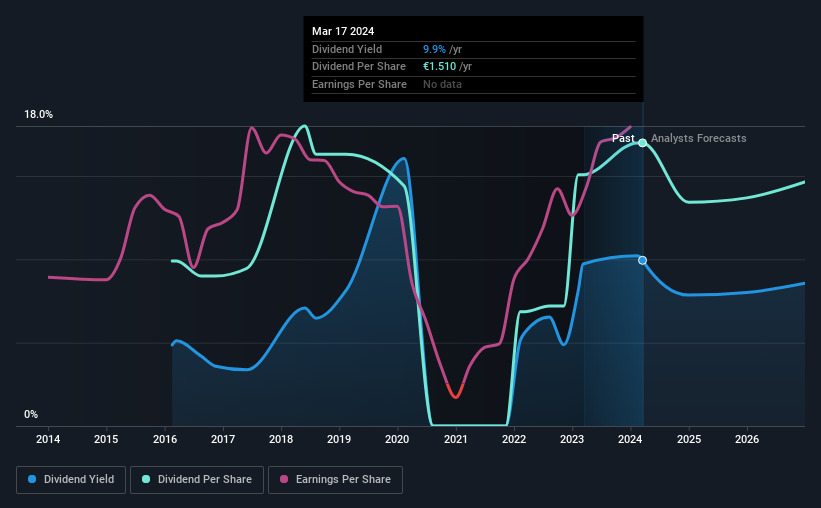
ABN AMRO Bank N.V. (AMS:ABN) has announced that it will be increasing its dividend from last year's comparable payment on the 27th of May to €0.89. This takes the dividend yield to 9.9%, which shareholders will be pleased with.
View our latest analysis for ABN AMRO Bank
ABN AMRO Bank's Payment Expected To Have Solid Earnings Coverage
We like to see robust dividend yields, but that doesn't matter if the payment isn't sustainable.
Having paid out dividends for 8 years, ABN AMRO Bank has a good history of paying out a part of its earnings to shareholders. Taking data from its last earnings report, calculating for the company's payout ratio of 51%shows that ABN AMRO Bank would be able to pay its last dividend without pressure on the balance sheet.
Over the next 3 years, EPS is forecast to fall by 16.4%. Despite that, analysts estimate the future payout ratio could be 50% over the same time period, which is in a pretty comfortable range.

ABN AMRO Bank's Dividend Has Lacked Consistency
Even in its relatively short history, the company has reduced the dividend at least once. If the company cuts once, it definitely isn't argument against the possibility of it cutting in the future. The annual payment during the last 8 years was €0.88 in 2016, and the most recent fiscal year payment was €1.51. This means that it has been growing its distributions at 7.0% per annum over that time. It's good to see the dividend growing at a decent rate, but the dividend has been cut at least once in the past. ABN AMRO Bank might have put its house in order since then, but we remain cautious.
ABN AMRO Bank Could Grow Its Dividend
Given that the dividend has been cut in the past, we need to check if earnings are growing and if that might lead to stronger dividends in the future. ABN AMRO Bank has impressed us by growing EPS at 5.3% per year over the past five years. The company is paying a reasonable amount of earnings to shareholders, and is growing earnings at a decent rate so we think it could be a decent dividend stock.
In Summary
Overall, it's great to see the dividend being raised and that it is still in a sustainable range. The dividend has been at reasonable levels historically, but that hasn't translated into a consistent payment. The payment isn't stellar, but it could make a decent addition to a dividend portfolio.
It's important to note that companies having a consistent dividend policy will generate greater investor confidence than those having an erratic one. However, there are other things to consider for investors when analysing stock performance. Case in point: We've spotted 2 warning signs for ABN AMRO Bank (of which 1 is a bit concerning!) you should know about. If you are a dividend investor, you might also want to look at our curated list of high yield dividend stocks.
New: Manage All Your Stock Portfolios in One Place
We've created the ultimate portfolio companion for stock investors, and it's free.
• Connect an unlimited number of Portfolios and see your total in one currency
• Be alerted to new Warning Signs or Risks via email or mobile
• Track the Fair Value of your stocks
Have feedback on this article? Concerned about the content? Get in touch with us directly. Alternatively, email editorial-team (at) simplywallst.com.
This article by Simply Wall St is general in nature. We provide commentary based on historical data and analyst forecasts only using an unbiased methodology and our articles are not intended to be financial advice. It does not constitute a recommendation to buy or sell any stock, and does not take account of your objectives, or your financial situation. We aim to bring you long-term focused analysis driven by fundamental data. Note that our analysis may not factor in the latest price-sensitive company announcements or qualitative material. Simply Wall St has no position in any stocks mentioned.
About ENXTAM:ABN
ABN AMRO Bank
Provides various banking products and financial services to retail, private, and business clients in the Netherlands, rest of Europe, the United States, Asia, and internationally.
Good value with adequate balance sheet and pays a dividend.


